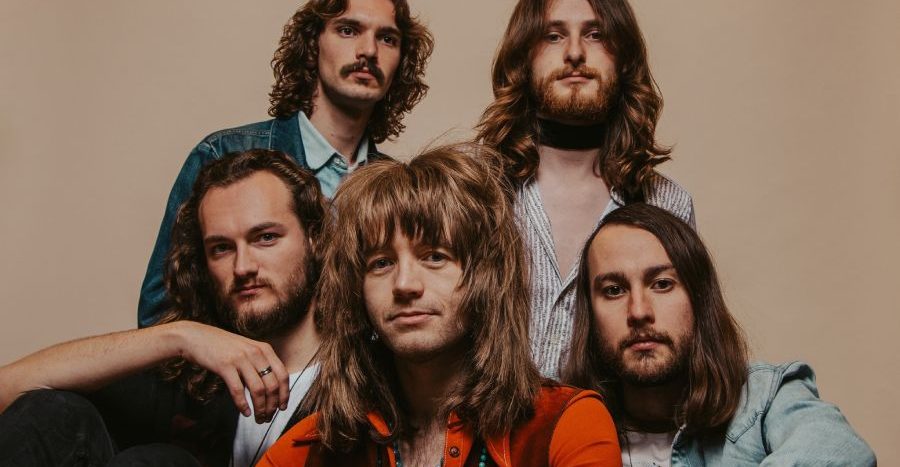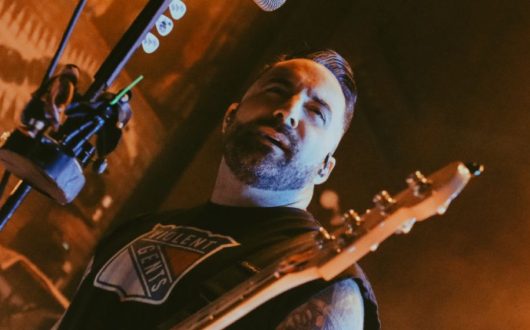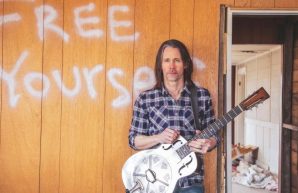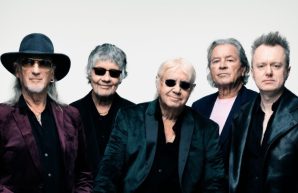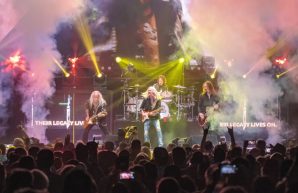Interview by Mark Lacey
Photo Credit: handofglorymedia
When Keylock changed their name to Silveroller after the pandemic, and reinveted themselves, there were numerous voices urging caution, or even sowing seeds of doubt. Fast forward a few year, the band are rising the crest of a wave, and have just wowed fans across the UK, playing support to Dutch blues marvels, DeWolff. Their debut EP sold out halfway through the tour, and fans are hungry for more. Silveroller’s vocalist, Jonnie Hodson oozes charm, charisma, and an undeniable Scouse sense of humour. MGM caught up with him a few days after their recent tour.
“I’m still recovering from two weeks on the road. You live your life three or four hours in a slightly different time zone to everybody else. You get up around 10-11am and you’re not going to bed until 2-3am. It’s like jet lag. Getting used to life again is really odd”.
MGM: How would you describe what Silveroller does?
Jonnie: I tend to tell people we’re rock n roll in the vein of Bad Company, the Black Crowes, the Faces, the Stones, Zeppelin, Free, Humble Pie, that vibe. It’s very honest rock and roll. There’s not many bells and whistles attached. I think we’re very much a fish out of water in the modern rock n roll scene in this country. We don’t look or sound like anybody else. There’s no one doing it quite like Silver Roller. It’s rock and roll in its traditional sense, from when the British Blues boom happened here and then developed into rock n roll; just an extension of that.
MGM: You’re still a young man, so will have missed a lot of that music first time around. How old are you, Jonnie?
Jonnie: Well, I’m somewhere in between 20 and dead, so I did miss it the first time around. But my musical schooling came from the Sweet, Queen, and then when Queen toured with Paul Rogers. I was obsessed with him, his voice, the bands he’d been in, and that took me on a journey of his career. In the ’90s, he did a solo record with a bunch of guitar players called ‘Muddy Water Blues’. I found that and that’s one of those moments in time for me where music changes. I went and found Muddy Waters and Howlin’ Wolf and Elmore James and John Lee Hooker and Sonny Boy Williamson and all those guys. Music changed again. Then I had this huge Chicago Blues boom and then into soul, and then back into rock n roll via Zeppelin, The Faces, The Stones, and The Who. I think my musical listening is very much between about ’65 and ’75; that’s probably the majority of my true musical interests. I’m really into Delta Blues, especially the ‘20s and ‘30s stuff. That stuff fascinates me. And I love Rival Sons and Blackberry Smoke, Cadillac 3 and Black Crowes and bands like that. I think we’re all of a very similar vein, especially me and Aaron. And if that’s what goes in, that’s what comes out. No one scratches their head and says, let’s write a song that sounds like The Faces, or Bad Company. That’s just what happens because that’s the influence.
MGM: In his earlier career, Aaron had a record deal as a solo artist. Then he did the Keylock band, and that band morphed into Silveroller, didn’t it? How did you guys meet?
Jonnie: I was touring with a band called Black Hat Bones. They were all based in Liverpool, and it had gotten too far away from the sound I was trying to make, and I felt like people weren’t necessarily on the same page I was, and not necessarily in a bad way. I’m not saying I was better than them. I’m not. But we’d split apart with what we think we were trying to do. I’d met Aaron and he was looking for a singer, and I was looking for a jam, and then it just came together quite naturally. We had a jam with a blues band that I’ve got going up here, and then we locked ourselves away and just started writing songs. That developed into getting a drummer in and a bass player and a piano player. And then we did the Keylock thing, which was never a name we wanted. We didn’t choose it, and it wasn’t Aaron’s choice either. It was a thing that was imposed upon us by some other people who will remain nameless. In the end, we just went, this doesn’t represent who we are and what we’re trying to do. I think for Aaron and that teenage guitar sensation thing; I think he’s a little tired of that because he’s now doing this. Obviously, it’s to be embraced. He was incredible and he still is. Silveroller really happened because it’s what we wanted from the beginning, especially after lockdown; people’s circumstances were changing, people were moving around. We just wanted to start as we meant to go on. We were told by the people around us at the time, who’ve since moved away, that we’d never be able to make it with a new name. We weren’t good enough songwriters. They threw the book at us a little bit and tried to scare us. That was the thing that really put the fire in the belly. We’re just confident in ourselves and the name and having that unique branding. Then we were signed to a record label who financially let us down and left us with the bill for the record. So, it’s been an interesting little ride the last 18 months.
MGM: Do the look at the origins of Silveroller beginning post lockdown when you changed the name? Or do you think about it as when you first met Aaron and started playing together?
Jonnie: I would say day zero for Silveroller was really when we released the first single. Obviously, that isn’t day zero to everybody, but that was when Silveroller became a band to the world, and people started taking notice of what we were doing. Really, day zero for Silveroller was the day I saw Queen with Paul Rogers and the day Aaron saw the Black Crowes and picked up a guitar. For Joe, the same, when he decided he was going to play the pots and pans, and when Jake wanted to be a bass player and when Ross wanted to play organ. They’re really the day zeros. Now it’s just a case of us running with the momentum we’ve got because the response to the record and the tour has been mind-blowing. Considering what we were told by the people that used to be behind us, we’re flabbergasted by the response.
MGM: You talked about your last band going in different directions. What was the vision when you first got Silveroller together? Bringing that classic ‘70s sound back?
Jonnie: I don’t think any of us have got any delusions of grandeur that we’re going to bring it back, and that there’ll be people walking around in bellbottoms for the next 10 years. We don’t really consider it a ‘70s sound. Obviously that influence is there because that’s what we’re all listening to. People have forgotten that idea of the frontman / guitar player being that visual focal point for a band. The days of Rod and Ronnie, Mick and Keith, Plant and Page, and Rodgers and Kossoff and all that stuff is in the past. I think people are just waking up to that again, that glimmer twins, bromance thing.
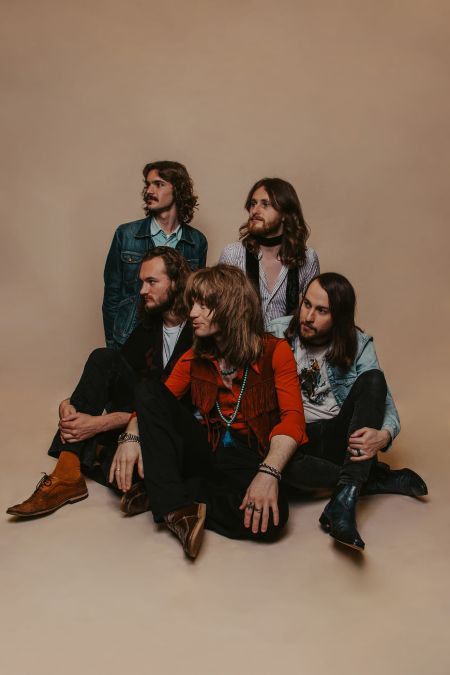
Photo Credit: handofglorymedia
MGM: A number of musicians have talked about the transition away from that lead singer / lead guitarist dynamic, especially around the early nineties, when bands like Nivana arrived on the scene. There seems to be a return to that trend now, and bands like Dirty Honey with that camaraderie between John Notto and Marc LaBelle really emphasising a new era.
Jonnie: People are comfortable with branding something with, ‘oh, that’s very retro’. But Zeppelin were playing stuff by Big Mama Thornton and Lead Belly and Muddy, and that was 20 -30 years old when they were playing it. We’re just carrying on that tradition of rock n roll, of taking roots music and playing it loudly. A lot of that new wave of classic rock stuff is all a little samey to me; no disrespect to anyone in that scene. There doesn’t seem to be a whole lot of difference between everybody. That’s perfectly fine for them. It’s not me having a go. I just don’t really think we fit in there. There was no real ‘modus operandi’ for Silveroller. It was just, let’s write rock n roll in the way we see it. We see it in a very similar way to people like Dirty Honey, Rival Sons, Cadillac 3 or Blackberry Smoke, and DeWolff. We’ve found that this is the sound that we make together. We may look like we’ve dropped out of 1974, but no one’s saying, let’s make sure we sound like that, because I don’t want to sound like that. I want to sound like we recorded last month.
MGM: Most rock music audiences in recent years have been predominantly male, but your shows bring a lot of women. Your music certainly seems to be more universally accessible, and audiences are dancing and having a good time. Have you noticed that trend?
Jonnie: I think that’s probably right. From bands that I’ve been in in the past, there is a more diverse audience, age-wise as well, which is great. It should be diverse. It shouldn’t just be a boy’s club. The idea of that makes my skin crawl. It should be for everyone. It’s rock n roll. It’s an all-encompassing art form. It should be diverse. It should be welcoming. I’d never want people to not feel welcome at a Silveroller show. If they did, I feel it’d be time to pack up and start over.
MGM: You’ve just put out your first EP ‘At Dawn’ which includes most of your live set. There are still a few songs not included that have been played live. How did the EP come about?
Jonnie: You’ve got your whole life to write your first record, haven’t you? The writing side of it was relatively easy because we do have a big backlog of songs from when me and Aaron first got together and we were doing the Keylock thing. We’re still writing. We still bounce ideas off one another. On the road, during soundcheck, we’ll kick new ideas around. With ‘Ways of Saying’; I wrote the verses for that in a band I was in years ago in Liverpool called ‘Stone City’ whilst I was in college. ‘Hold’ was written a couple of months before we recorded the record. It’s quite a mix of stuff that’s been around for a while, and some that hasn’t. We recorded in a great studio in Wigan with Gareth Nuttall, who was fantastic. He couldn’t believe that we wanted to record live. I think most of the bands that he has, the drummer goes in on the first day, the bass player, then the guitar player, and then the vocalist goes in. Never the band shall meet. But we wanted to track it live without click tracks, and no auto tune on the vocals. We wanted it warts and all. Gareth was incredible. That’s what was suggested to us by the label we were on at the time, who are going to remain nameless, because they reneged on paying, and we had to pay for it. That left the band financially in a bit of a mess. We scraped the cash together because we wanted to get it out. Under Keylock, we released ‘Shine on Me’ and Planet Rock Radio playlisted it. And then we did Winter’s End and there was this big buzz. And then lockdown happened, so we couldn’t do anything about it. We wanted to get the music out because it feels like we’ve been threatening to do it forever. For one reason or another, it stood in the way. If we had to eat noodles from now until 2025, we were going to get that record out.
MGM: Presumably because you’ve ended up paying for those recording sessions, you must own all the rights to it, and don’t have to worry about the record label having a stake in it. There will be label interest in the future, for sure, so hopefully that experience won’t sour your willingness to work with others in the future?
Jonnie: That is the thing. Especially post-tours, we’re now looking to do more, and we want to make sure there’s another record on the way. We’ve got the material, we’ve got demo sessions booked in, and we want to make sure that there is a follow-up relatively quickly. And hopefully to work with a good label on that, because whilst being independent is great, I think it can only get you so far. The backing of a good crew is really what we need.
MGM: This EP has received high praise from reviewers, in part because it has a sound quality that really matches the quality of the songwriting and musicianship. It’s really brought out the character of your sound. You mentioned that you have a whole bunch of other songs to pick from, including ones you’ve played live, like ‘Start Walking’, ‘Nobody’s business’ and ‘Trouble follows me’. You’ve also mentioned ‘Shine on Me’. Why did you stop recording at six songs, rather that add those others and put out a full album?
Jonnie: The original idea was to do two back-to-back EPs when the label had said they were going to pay for it. Two EPs equals LP, which sounded great to us. We had someone quite well known in the industry who’d worked with a lot of bands. When they hired him, he picked the tracklist for both EPs from the demos. We trusted him and we still do. We recorded them because that’s what we were told to do at the time. And then it was only months afterwards when no one had heard from anybody and the producer was asking me what was going on, that we had to pay for it ourselves. In hindsight, it would have been great to have made a full record, although I’m proud of the EP. Personally, I’d prefer to do little and often. I’d rather release an eight track every six months rather than fourteen songs every two years. But if a label comes in, it’s their choice.
MGM: You talked about ‘Ways of Saying’, which is one of the finest tracks on the EP, but what is that song about?
Jonnie: It occurred to me a while ago that there is only one real way of verbally saying ‘I love you’. There’s many ways of showing it, and there’s many ways of portraying it to somebody, but to actually say it, there is only one defined way. It’s my own little lament upon that. It’s changed quite significantly since I first wrote it. I don’t know where the original lyrics are, but it’s certainly different to how it was, and it developed over time. That’s usually from mine or Aaron’s imagination. It’s that simple message of that one way of saying ‘I love you’.
MGM: ‘Come on, come in’ is another interesting track on the EP, will a slower vibe. What does that one mean for you?
Jonnie: That’s a survival of despair, not to get too dark. I really like to ask people what they think it means, because what it means to me and what it means to you are probably very different, and both right. It’s a little moment in time where I was at the bottom of the barrel and thinking, God, this can’t get any worse. And then, all of a sudden, yes, it does. And surviving that. Everyone’s had that at one point or another, and if you haven’t had it, just keep living and it will happen. It’s just a message of hope for myself and for anyone hearing it. But it’s really for whatever anybody wants to use it for. Someone gave me a wild interpretation of ‘Come on, come in’, and I was like, Yeah, that’s absolutely spot on, because that’s what it means to them, and that’s fine.
MGM: One of the more upbeat songs on the album is ‘Black Crow’ and that song has become your trademark, as well as your set opener. You can hear the Paul Rodgers influence. Where does that song fall in your journey?
Jonnie: That was an interesting one, actually. There was not a lot to do over lockdown. I got really into meditating and looking inwardly a little bit and trying to protect my own state of mind. I did this guided meditation, which I thought was never going to work. And it did. I had this almost lucid dream of following a black crow. When I was thinking about it a day or so later, I just wrote this set of lyrics. Then we jammed it out a couple of times, and I had an idea of how I wanted it to sound. The boys went and put a song around the idea. I’m not sure if we played it live before we recorded it, I don’t think we actually ever did. Joe was like, this is a record opener. It’s a show opener. And I think he’s right. It’s definitely got that vibe to it.
MGM: You’ve just toured with DeWolff for the second time in six months. Your two bands are such a great match, not just in terms of the style and energy of the music, but you share such a great chemistry and camaraderie. At the final show of the tour in London, Silveroller joined DeWolff onstage for a jam of the Free track ‘Walk in my shadow’. How did that relationship between you guys and DeWolff come about?
Jonnie: It was really strange; we did three dates on that tour with Jared James Nichols and DeWolff. At the time when we got that offer, we didn’t have any music out, but Jared knew Aaron from meeting him at NAMM in the States. Jared said, I think, at some point we’ll do some shows together when I’m in the UK. Then we got a message on Instagram just saying, are you free for these dates? Do you want them? It was, Oh, God, yeah! And DeWolff are playing. Wow, they’re killer. We were fans and we are fans of them. They’re a great band. When we met them on the first date in Bradford, the two outfits just got on like a house on fire. In Bristol, at the end of the little run we did with them, we said, ‘If you’re coming over in March, maybe we could open for you a couple of shows’. Their manager sent us a message saying, we’d like to offer you the tour, and we were buzzing. The relationship between the two bands just grew on this tour. There’s no egos in either band and everyone got on. Before the Nottingham show we took them for a carvery because they’d never had one. So, feeding Yorkshire puddings to the Dutch, that’s an achievement, I think.
MGM: How do you reflect on the tour you’ve just done? You were up and down the country.
Jonnie: I don’t like to use the word “luck” too much because that assumes that we haven’t put any effort in or there’s no talent. But we’ve been fortunate, I suppose, to have Jared reach out to us and offer us those dates and then to meet DeWolff, and then go on such an extensive tour with them at the time that we released the record. It’s certainly the longest tour Silveroller has been on.
MGM: Which dates really stood out for you, apart from the carvery and Nottingham.
Jonnie: That was it. That was the pinnacle. You know what? There wasn’t a bad date on the road, I don’t think. I didn’t have the best sound on stage in Bristol. Very rarely do I ever feel uncomfortable on stage, but I was like, I can’t get this right tonight. But it was still a good show. The three dates in Scotland were amazing. Newcastle, the first date was unbelievable because neither us nor DeWolff knew what to expect, and we walked on stage and the audience went right to the back and they were in the mood for rock n roll. It was like, this is going to be good. Let’s hope this keeps up. And it did. Sell-out crowds, very responsive audiences. We sold out of records at one point and we had to put another order in, which is the best thing ever. As a relatively new outfit, selling out of your merch and having to re-order halfway through the tour is not a bad thing. The O’Meara in London was great as well. We had a day off after Manchester, and people started talking about having a jam. At first, I think someone had mentioned ‘Whipping Post’, and then everyone’s trying to furiously go and learn all those very complex sections. Both bands had been playing Free in soundcheck, and it almost became an unspoken competition. Someone’s come and brought ‘Broad daylight’. Okay, we’ll go and learn ‘Ride on Pony’ or ‘I’m a mover’ or something. And then I said to Pablo, instead of ‘Whipping post’, would it be easier to do ‘Walk in my shadow’? It’s a twelve bar. Everyone can fill their boots and have a jam. It was like, yeah, that’s dead easy. Let’s just do that. I think we ran it once in soundcheck and no one was paying any attention; everyone was just getting off on jamming with one another. And then we did it at the end of their first encore.
MGM: With the success of this tour, and your now sold-out EP, the scene has been set for a bright 2024. What do you see the band doing next?
Jonnie: We’re in that planning stage now. We need management, booking agents, etc. We’re just getting that team around us and forming a proper plan. After having to pay for the record ourselves, financially there wasn’t a lot of money left to make big plans. So now we’ve been offered a few dates and we’re just lining the ducks up to make sure everything works properly. We don’t want to just be everywhere all the time either. We want to make sure we’re doing the right things.
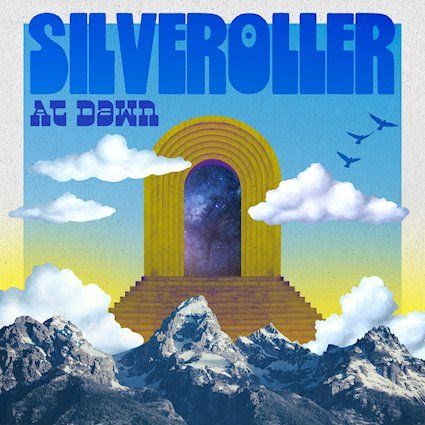
For mor information:
www.facebook.com/SilverollerBand/
Silveroller’s debut EP ‘At Dawn’ is available here:
https://silveroller.bandcamp.com/album/at-dawn
